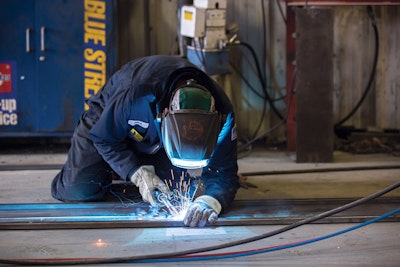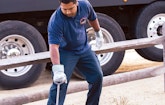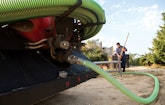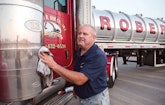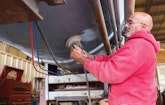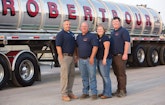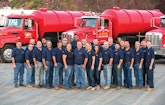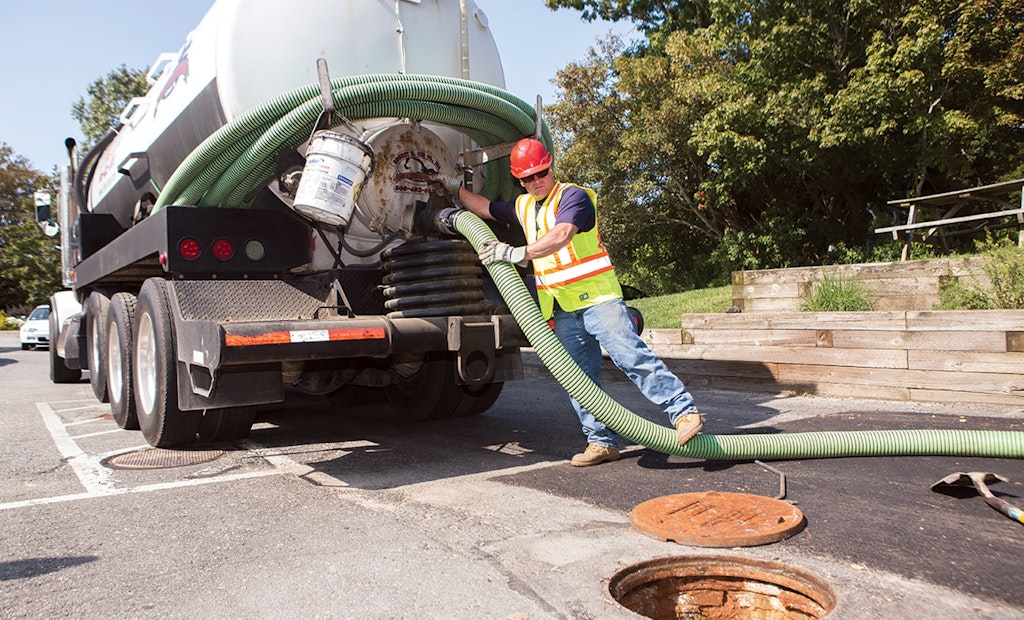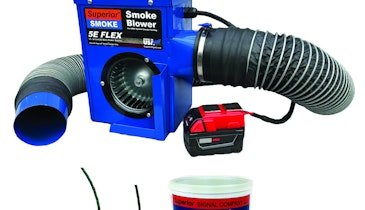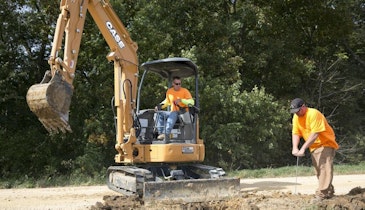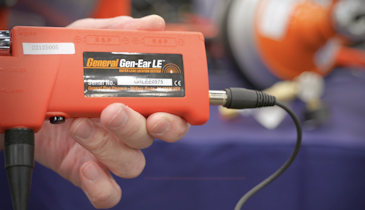Interested in Pumps?
Get Pumps articles, news and videos right in your inbox! Sign up now.
Pumps + Get AlertsThe Cape Cod peninsula in Massachusetts has seen tremendous changes since the 1950s when Robert Our Sr. worked as a commercial fisherman and installed cesspools on the side. The population then was 40,000. Now there are 200,000 year-round residents, increasing to 500,000 in the summer; tourism is the main industry; and cesspools have given way to evermore sophisticated septic systems.
Our soon gave up fishing, and he and his wife, Joan Our, started a septic company, which grew and evolved right along with the Cape, and it now employs 160 people. The Robert B. Our Co. today is at the forefront of an issue the Cape is grappling with, namely sewering.
The company is now run by Robert Our Sr.’s children, Chris Our, John Our and Hope Our Cleary. Chris Our oversees daily operations, banking, bonding, insurance and bids; John Our manages field operations; and Hope Our Cleary handles office functions. Their brother, Robert Our Jr., passed away in 1992, but his son, Robert B. Our III, is also an owner and very active in the business along with eight of his cousins. And their mother, Joan Our — an integral part of the company from the beginning — still comes into the office. “She’s 84 now, but she’s still here checking on us,” Chris Our says.
The company’s main office is in Harwich, and they have recently expanded to a second location in Mashpee after buying out a business there. Their service territory covers all of the Cape as well as a couple of adjacent counties.
A LOOK BACK
The eldest Robert Our’s foray into septic work was an effort to supplement his income from fishing — an industry heavily reliant on good weather — and provide for a growing family. He incorporated the company in 1957 and then bought a truck: “An old fuel truck that had a little gas-powered Briggs & Stratton mud sucker,” Chris Our says. During the 1960s, he had a handful of helpers. In the 1970s, the business grew during a residential building boom.
By the 1980s, when Robert Our’s children, who had grown up in the business, were getting out of school and coming on full time, the company expanded into municipal and sewer work. In the 1990s, the eldest Robert Our and his key helper Joseph Gomes both became ill and the children took over. Robert Our Sr. passed away in 2007. Today, the company is involved in every aspect of the septic industry from pumping residential tanks to building municipal sewer plants. So whether the Cape goes to sewer systems or sticks with septic for a while, they’ve got it covered.
SEPTIC SERVICES
Billy Smith oversees the septic pumping and repair division, which employs 20 people — 10 drivers, four drain technicians, two plumbers, two electricians and two pump/mechanical technicians. Mike Eldredge works with Smith on the installation side, which typically runs two or three crews, or 12 to 15 people.
The company has six Peterbilt vacuum trucks (2006-13), most built in-house with steel tanks ranging in size from 3,500 to 5,000 gallons and Masport HXL400WV pumps.
The also have two tankers — a 2017 Arthur Custom Tank LLC, a division of Mid-State Tank Inc. with a 9,000-gallon aluminum tank and National Vacuum Equipment 866 Challenger pump and a 1994 Pioneer with an 8,000-gallon steel tank and National Vacuum Equipment 607 Challenger pump — used for large, private cluster onsite systems as well as hauling sludge from municipal treatment plants. They use fleet tracking software from Fleetmatics.
Equipment includes a RIDGID KJ‑2200 2,200 psi water jetter, a Spartan Tool 758 5,000 psi trailer jetter, four Spartan Tool 717 electric jetters, 12 Spartan Tool cable machines (models 81, 100 and 300), and a Spartan Tool SparVision 200 camera and locator.
Chris Our describes the evolution of the septic industry on the Cape: “Back in the 1970s, we did 110 to 130 calls a day in the summer. But they were little 3-foot cesspools, so you could get five or six (loads) on a truck. Then you’d run to town and dump in an open lagoon. Now the minimum is a 1,500-gallon septic tank; so you get two or three on a load, and you to run to the treatment plant, and they’ve got to sample it. It takes a lot longer.”
The changes have come about as the Cape has developed regulations designed to protect and clean up an environment where groundwater is close, it’s all sand, and there are a lot of wetlands and waterfront. “Sometimes we have to pour containment walls and raise (systems) up in the air. It’s like a foundation but sticking out of the ground,” Our says. “You can drive down the road and all of a sudden see the big hump in somebody’s yard where the septic is.”
The local treatment plants are strained in the summer, so the company often hauls septage as much as 70 miles away to off-Cape facilities to relieve the burden. “For us it’s okay,” Our says, “because we have the bigger trucks and the tankers, but for some of the smaller guys, it’s hard for them.”
MUNICIPAL SERVICES
Municipal projects account for about 60 percent of the company’s work. “As the country changed and grew and technology evolved over the years, we grew with it,” Our says. “Now we do a lot more with secondary treatment plants, onsite septic treatment, municipal treatment plants, water pump stations. We’ve grown with the market to do what the market has changed into.”
Lead estimator/project manager is William McMahon who tag teams with John Our’s daughter Abby Our Rose on projects. Damon Burchill oversees treatment plant construction projects. Andy Allen and Craig Tombly manage earthwork. All estimator/project managers attend weekly meetings. “We go over our workload, our schedule, where we are,” Chris Our says. “We all sit in one room and hash out who gets what and where and when and try to make it work.”
The company has an extensive line of equipment including nearly 20 excavators (Link-Belt Construction Equipment, Caterpillar, Samsung), about 15 loaders (Komatsu America, Volvo Construction Equipment, Caterpillar), three Case Construction Equipment backhoe/loaders, as well as Caterpillar skid-steers and soil compactors, LeROI compressors, cranes from Tadano Mantis and American Crane & Equipment, Volvo Construction Equipment dump trucks, a Hyster forklift, Athey grader, BOMAG Americas recycler, Read and McCloskey International screeners, Laymor sweepers, Caterpillar soil compactors, H & M and ICE vibratory hammers.
Our says only four towns on the Cape currently have sewer systems. But the state is pushing the local towns to install sewers to clean up the waterways and bays. Some are under design and going through the permitting process and the towns are trying to figure out the financing. But he thinks it will be a slow process. “The problem is they scare the homeowners with what it costs. And it always takes twice as long and costs twice as much. When you think a project is going to happen in the next five years, it’s 10 years.”
But the work has begun in some places. In 2016, the company finished a $20 million sewer project for Falmouth. And in the early 2000s, it partnered with two other companies to bid on a project to build a sewer system for Provincetown, a project that ultimately took over 11 years as more and more phases were added.
MISCELLANEOUS SERVICES
The company has a few other service offerings for its customers. It provides construction and towing services for the marine industry, recycles asphalt and concrete to create road base and other materials, and grinds and recycles wood for use as mulch or ground cover and for powering industrial facilities. It also sells landscape products such as topsoils, gravel, stone, crushed shells and mulches. These products are stored in a retail yard at the company’s facility.
Our says there are a few more factors in the company’s long-term success strategy. They include the following factors:
Keeping employees happy. The company experiences very little worker turnover. “A lot of people want to work for us because we’re a large company in this market. And we take care of our people.” Benefits include profit-sharing, a 401(k) plan, health insurance, dental insurance, and other insurance through Aflac. Company-wide meetings are held in March, and safety-training sessions are conducted throughout the year. That includes weekly Toolbox Talks for dispatch workers in the main office to go over safety topics — proper lifting techniques, operator and laborer coordination, how to get out of a vehicle. In the summer, the company sponsors a family cookout at a YMCA camp.
Proven marketing. In addition to a strong website presence, the company sends out coupons and advertises in newspapers, in flyers and on the radio. The company’s bank recently featured it in a commercial, and that program will continue at Our’s expense.
Focusing on giving back. The company is enthusiastic about supporting the community. They give generously to numerous charitable concerns including the Cape Cod Baseball League, local sports and educational programs, and The Family Pantry, where several family members volunteer.
A LOOK AT THE FUTURE
As the company celebrated its 60th anniversary last year, the three siblings were coming up on their 60th birthdays and thinking about passing the baton to the next generation. They are working with legal and insurance advisors to hammer out the details.
“Their hearts are in this company to grow it,” Our says of the younger family members. “And I just hope they prosper, and do good, and keep the reputation of the company going. Hopefully my brother and I can slow down a little bit and enjoy our retirement before we’re too old.”
As for the industry outlook and the type of work the new team will be taking on, “The future down here is going to be the sewer type work,” Our says. “Septic is going to be more maintenance and grease traps. But it’ll take a while.”
